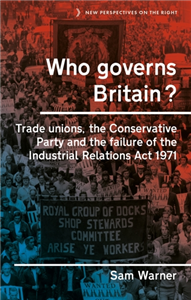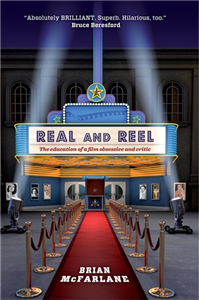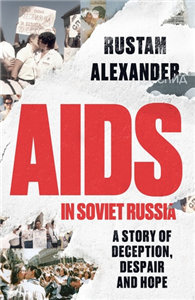Your Search Results
-
Promoted Content
-
Promoted ContentHumanities & Social SciencesApril 2025
Bordering social reproduction
Migrant mothers and children making lives in the shadows
by Rachel Rosen, Eve Dickson
Bordering social reproduction explores what happens when migrants subject to policies that seek to deny them the means of life nonetheless endeavour to make and sustain meaningful lives. Developing innovative theorisations of welfare bordering, the volume provides rich ethnographic insights into the everyday lives of destitute mothers and children who are denied mainstream welfare support in the United Kingdom due to their immigration status. This book shows how enforced destitution and debt work alongside detention and deportation as part of a tripartite of exclusionary technologies of the racial state. It advances the novel concept of weathering to comprehend mother's and children's life-making practices under duress - arguing that these are neither acts of heroic resilience nor solely symptomatic of lives rendered disposable, but indications of the fragilities of repressive migration regimes and, on occasion, refusals to accept their terms of existence.
-
 Trusted Partner
Politics & governmentFebruary 2017
Trusted Partner
Politics & governmentFebruary 2017Sunningdale, the Ulster Workers' Council strike and the struggle for democracy in Northern Ireland
by Edited by David McCann, Cillian McGrattan
The 'Sunningdale experiment' of 1973-4 witnessed the first attempt to establish peace in Northern Ireland through power-sharing. However, its provisions, particularly the cross-border 'Council of Ireland', proved to be a step too far. The experiment floundered amid ongoing paramilitary-led violence, finally collapsing in May 1974 as a result of the Ulster Workers' Council strike. Drawing on new scholarship from some of the top political historians working on the period, this book presents a series of reflections on how key protagonists struggled with notions of power-sharing and the 'Irish dimension', and how those struggles inhibited a deepening of democracy and the ending of violence for so long.
-
 Trusted Partner
Humanities & Social SciencesApril 2023
Trusted Partner
Humanities & Social SciencesApril 2023Who governs Britain?
Trade unions, the Conservative Party and the failure of the Industrial Relations Act 1971
by Sam Warner
Providing fresh insights from the archival record, Who governs Britain? revisits the 1970-74 Conservative government to explain why the Party tried - and failed - to reform the system of industrial relations. Designed to tackle Britain's strike problem and perceived disorder in collective bargaining, the Industrial Relations Act 1971 established a formal legal framework to counteract trade union power. As the state attempted to disengage from and 'depoliticise' collective bargaining practices, trade union leaders and employers were instructed to discipline industry. In just three-and-a-half years, the Act contributed to a crisis of the British state as industrial unrest engulfed industry and risked undermining the rule of law. Warner explores the power dynamics, strategic errors and industrial battles that destroyed this attempt to tame trade unions and ultimately brought down a government, and that shape Conservative attitudes towards trade unions to this day.
-
 Trusted Partner
Trusted Partner
-
 Trusted Partner
2020
Trusted Partner
2020How Animals Hammer, Drill and Strike
Tool Use in the Animal Kingdom
by Peter-René Becker
From insects to fish as well as birds and primates: the use of tools is amazingly widespread in the animal kingdom. It’s a misnomer to presume that humans are distinguished by tool use and conscious capacity. So where is culture initiated? The biologist Peter-René Becker has evaluated numerous studies and cites plenty of evidence for the use of the hammer and anvil, lances, bait or sponges. Animals also use “tools as social implements”. Ultimately, the depth of man’s conscience singles him out from other animals.
-
 Trusted Partner
Humanities & Social SciencesSeptember 2014
Trusted Partner
Humanities & Social SciencesSeptember 2014Collieries, communities and the miners' strike in Scotland, 1984–85
by Jim Phillips
-
 Trusted Partner
Humanities & Social SciencesOctober 2017
Trusted Partner
Humanities & Social SciencesOctober 2017Collieries, communities and the miners' strike in Scotland, 1984–85
by Jim Phillips, Steven Fielding, John Callaghan, Steve Ludlam
-
 Trusted Partner
Business, Economics & LawMay 2025
Trusted Partner
Business, Economics & LawMay 2025Steelworkers in struggle
An oral history of the 1980 national steel strike
by Charlie McGuire
Using oral histories gathered from trade unionists, this book explores the national steelworkers strike of 1980 and asserts its significance as a key turning point in modern British history. The strike was nominally a response to a 2% pay offer made by British Steel Corporation (BSC), at a time when inflation was 17%, but was generated by the widespread works closures that characterised the British steel industry at this time. The outcome of the strike was a much higher pay increase but no change to the deindustrialisation strategy of BSC and the government. The book explores the strike from the perspective of those who fought it and reveals the short and longer-term consequences it had on the industry, the unions and the workers themselves.
-
 Trusted Partner
Trusted Partner
-
 Trusted Partner
Humanities & Social SciencesSeptember 2013
Trusted Partner
Humanities & Social SciencesSeptember 2013Crisis? What crisis?
The Callaghan government and the British ‘winter of discontent’
by John Shepherd
Over thirty years later, the 'winter of discontent' of 1978-79 still resonates in British politics. On 22 January 1979, 1.5 million workers were on strike. Industrial unrest swept Britain in an Arctic winter. Militant shop stewards blocked medical supplies to hospitals; mountains of rubbish remained uncollected; striking road hauliers threatened to bring the country to a standstill; even the dead were left unburied. Within weeks, the beleaguered Callaghan Labour government fell from power. In the 1979 general election, Margaret Thatcher became Prime Minister, beginning eighteen years of unbroken Conservative rule. Based on a wide range of newly available historical sources and key interviews, this full-length account breaks new ground, analysing the origins, character and impact of a turbulent period of industrial unrest. This important study will appeal to all those interested in contemporary history and British politics. ;
-
 Trusted Partner
The ArtsJune 2021
Trusted Partner
The ArtsJune 2021Cinesonica
Sounding film and video
by Andy Birtwistle
Cinesonica: sounding film and video explores previously neglected and under-theorised aspects of film and video sound, drawing on detailed case study analyses of Hollywood cinema, art cinema, animated cartoons, and avant-garde film and video. Adopting an interdisciplinary approach to the study of the soundtrack, and breaking away from the focus on narrative and signification that has tended to dominate the study of film sound, the book examines the way in which sound's materiality figures within audiovisual experience. Through a close examination of sound-image relations in a range of film and video forms and genres - including Warner Bros. cartoons, scratch video, and artist's film and video - Cinesonica recasts the film and video text as the meeting point of audio and visual materialities, cultural practices and perceptual activity. The interdisciplinary approach adopted by the book makes its discussion of sound of interest to those studying and working in a range of subject disciplines, including film studies, sound studies, sonic arts, cultural studies, music and art history.
-
 Trusted Partner
The ArtsNovember 2011
Trusted Partner
The ArtsNovember 2011Real and Reel
The education of a film critic
by Brian McFarlane
From a little before ten years of age Brian McFarlane became addicted to stories told on the screen, and the mere fact that he had difficulty in getting to see the films he wanted - or any for that matter - only made them seem more alluring. But it wasn't just seeing the films that mattered: he also wanted, and quite soon needed, to be writing about them and these obsessions have been part of his life for the next sixty-odd years. Real and reel is a light-hearted and but deeply felt account of a lifetime's addiction. It is one particular writer and critic's story, but it will strike sparks among many others. Though many other interests have kept Brian McFarlane's life lively, nothing else has exerted such a long-standing grip on the author's imagination as film. Editor of the Encyclopaedia of British Cinema, co-editor of Manchester University Press's British Film Makers series, and author of over a dozen critical works on film and adaptation, Brian McFarlane's autobiographical Real and reel can also be read as a biography of the subject of Film Studies itself. ;
-
 Trusted Partner
Humanities & Social SciencesFebruary 2026
Trusted Partner
Humanities & Social SciencesFebruary 2026AIDS in Soviet Russia
A story of deception, despair and hope
by Rustam Alexander
The first book to tell the shocking story of the AIDS crisis in Soviet Russia. Throughout the 1980s, as the world was grappling with the escalating crisis of AIDS, Soviet Russia continued to deny there was a problem. Arguing that the disease was limited to foreigners and 'immoral' groups, the government failed to take meaningful action, long past the point other countries had begun to recognise the full scale of the threat. In this ground-breaking book, Rustam Alexander tells the story of AIDS in Soviet Russia. Fixated on disinformation, censorship and the persecution of marginalised communities, the Soviet authorities wasted precious time, allowing the epidemic to strike at the very heart of the nation: its children. Yet, despite the government's failure, a number of brave journalists, doctors and nascent gay groups decided to take matters into their own hands and engage in full-fledged AIDS activism. Tracing the political and social response to AIDS in the final years of the Soviet era, Alexander sheds light on the devastating consequences of government inaction. He draws on personal stories, media reports and archival materials to provide a riveting account of the Russian people's fight against AIDS amid the tumultuous transformations of Gorbachev's perestroika.
-
 Trusted Partner
Society & culture: general
Trusted Partner
Society & culture: generalA TIME OF WOLVES: GERMANY AND THE GERMANS 1945 - 1955
by Harald Jähner
A dance among the ruins: Harald Jähner’s major new portrait of Germany’s post-war societyCountless former soldiers drift through the towns and cities; countless children grow up without a father. The old order has been destroyed and although the streets seem eerily empty, the traditional annual street carnivals are soon back in full swing, jazz can be heard among the ruins, intellectuals rekindle a culture of discussion and debate.Harald Jähner’s book is the first history of Germany’s national mentality in the immediate post-war period. It focusses on the German people in all their diversity: the “re-educators” Alfred Döblin and Rudolf Herrnstadt, who tried in two different zones of occupation to win the trust of their fellow Germans; Beate Uhse, owner of a mail order company for “marital hygiene”, who questioned the old moral code governing what was deemed proper; the many nameless black market traders, pockets stuffed with Lucky Strike cigarettes; stylish housewives sitting at kidney-shaped coffee tables that were to become emblematic for a freer and affordable world. Using major political developments as a backdrop, this book weaves a series of life stories into a nuanced panorama that makes the monumental changes affecting the nation tangible for its readers. 1945 to 1955 was a raw, wild decade poised between two eras, portrayed here as a period that proved decisive for Germany’s future development – and one starkly different to how most Germans imagine it today.
-
 Trusted Partner
April 2024
Trusted Partner
April 2024Fact-Immune
Why science denial is so dangerous and how we can protect ourselves against it
by Holm Gero Hümmler
The phenomenon of anti-scientific disinformation has been discussed in the recent past under the acronym FLICC (Fake experts, Logical fallacies, Impossible expectations, Cherry-picking and Conspiracy theories), especially as it pertains to the topic of climate change. What is generally missing however is a more comprehensive consideration of science denial in diff erent disciplines with a critical examination of the central arguments and a comparison of the parallels. Holm Gero Hümmler dedicates himself to this task in this readable and fact-orientated book on topics such as genetic engineering, mobile phone networks, radioactivity, and chips that are implanted under the skin for medical reasons.
-
 Trusted Partner
Humanities & Social SciencesNovember 2012
Trusted Partner
Humanities & Social SciencesNovember 2012Collieries, communities and the miners' strike in Scotland, 1984–85
by Jim Phillips, Steven Fielding, John Callaghan, Steve Ludlam, Bethan Hirst























